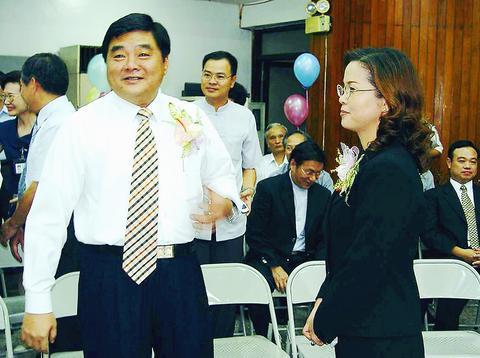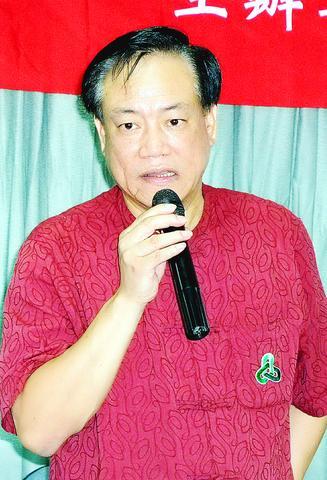Former People First Party (PFP) lawmaker Liu Sung-fan (
Liu is currently in New York and there is no indication he is planning to returning home.

PHOTO: THE TAIPEI TIMES
The former lawmaker, who was Speaker of the Legislative Yuan for the Chinese Nationalist Party (KMT) from 1992 to 1999, is not alone in his voluntary exile -- many politicians and businesspeople facing legal problems have fled the country rather than appear in court or serve time.

PHOTO: THE TAIPEI TIMES
Law enforcement personnel are also looking for former independent legislator Wu Tzer-yuan (
The Ministry of Justice, the Bureau of Investigation and the National Police Agency said that their personnel will carry out their orders to locate and arrest these people -- regardless of politics.
Taipei District Prosecutors' Office Spokesman Chen Hung-ta (陳宏達) said that the law mandates that a convicted person is supposed to report to the local prosecutors' office on time to begin his or her jail term or that person will be declared a fugitive. A person can also be declared a fugitive if he or she fails to appear after three summonses and law enforcement officers cannot locate him or her despite three attempts.
"For their families' and their own good, I would suggest these people face whatever responsibilities they have," Chen said.
Liu and Tseng
On Sept. 7, the Taiwan High Court's Taichung branch sentenced Liu to four years in jail for corruption, declaring a final verdict.
Prosecutors said Liu will be declared a fugitive if he fails to report to the prosecutors' office to begin his jail term. However, since Liu's family has yet received the official High Court verdict, the date Liu's jail term is set to begin is not yet known.
Liu was president of the Bank of Taichung -- later renamed the Taichung Business Bank -- from October 1992 to October 1998, when Tseng replaced him.
Taichung prosecutors alleged in 2001 that Tseng had abused his position as bank president in November 1998 to push through loans worth more than NT$9 billion. They said he also kept dummy accounts in six companies to facilitate his illegal transactions.
According to the Sept. 7 verdict, Liu served as a middleman for Tseng in these activities. The court found Liu conspired with the Chihching Co to conceal one of Tseng's dummy accounts. Chihching, which only had NT$2 million in capital, managed to secure a NT$1.5 billion loan from the Taichung Business Bank and Liu received NT$150 million in kickbacks.
On June 8, Tseng was sentenced to 11 years in jail in this case. But he disappeared with his wife on June 14 and is now thought to be living in Shanghai.
Wu Tzer-yuan
The Panchiao District Court convicted Wu on a raft of corruption and fraud charges in 1996 for his involvement, as a then-KMT member and director of the Taiwan Provincial Government's Planning and Development Department, in a kickback scandal over the 1992 Sipiantou (
In 1997, however, the Taiwan High Court upheld a prosecutor's request that Wu be detained.
In May 1998, Wu was released on bail of NT$3.6 million for medical reasons and banned from leaving the country. Seven months later he was elected as an independent lawmaker for Pingtung County, thereby acquiring the judicial immunity enjoyed by legislators during legislative sessions.
Wu's campaigning for KMT presidential candidate Lien Chan (
Wu won re-election on Dec. 1, 2001, and shortly afterward was named as a leader of a legislative delegation for a trip to Japan. The court granted him temporary permission to leave the country for that trip.
He left Taiwan with the rest of the delegation on Dec. 29, 2001 -- but did not return with the others. His legislative office announced a month later that he had flown to Bangkok. The Bureau of Investigation later said that Wu had been spotted by its special agents in Guangzhou, China.
On Nov. 19, 2002, the Taiwan High Court declared Wu a fugitive after he failed to answer any summons in connection with his appeal of the case.
Chang Jung-wei
The former Yunlin County commissioner is also in serious legal trouble. Yunlin County prosecutors want him for their investigation into the Linnei Township incinerator construction scandal. He faces a 12-month jail term handed down by the Taiwan High Court's Taichung branch on Aug. 26 for his involvement in bribery connected with the 1994 Yunlin County Council speakership election, although he could still appeal the verdict.
Chang's whereabouts have been a mystery since Aug. 13, when prosecutors and Bureau of Investigation's special agents raided his office and residence regarding the investigation of the incinerator scandal. He has been declared a fugitive for failing to respond to Yunlin prosecutors' summonses for three times and three arrest attempts as well.
Law enforcement officers believe Chang fled to China but his family insists that he is still here.
Prosecutors said Chang is in a tight position because all the witnesses' testimony has been against him.
"That is why we need him to tell us his story," said Tsai Chi-wen (
Ho Chih-hui
Ho has been living in Shanghai ever since prosecutors indicted him on charges of corruption, theft and breach of trust and recommended an 18-year sentence on May 7.
Ho never responded to any court summons and was declared a fugitive after missing three hearings and three arrest attempts.
According to the Taipei pro-secutors' indictment, Ho took advantage of his position as Miaoli County commissioner in 1995 to obtain a loan from the Hsinchu Commercial Bank to help fund his wife's legislative campaign.
The bank allegedly gave him a NT$300 million (US$9.09 million) loan despite his lack of credit-worthiness -- a violation of the Securities Transaction Law (證券交易法).
The indictment alleges that in 1997, Ho, in his role as commissioner, illegally pressured his subordinates to approve a construction proposal submitted by Chiu-chun Development Co even though company had failed to provide a complete environmental protection plan for the project. Prosecutors said Ho received a NT$320 million bribe from the company in exchange for his help in getting the proposal approved.
Ho is also alleged to have used his connections in 1999 to obtain a NT$200 million loan from the Kuo Hua Life Insurance Co.

Chinese Nationalist Party (KMT) Chairman Eric Chu (朱立倫), spokeswoman Yang Chih-yu (楊智伃) and Legislator Hsieh Lung-chieh (謝龍介) would be summoned by police for questioning for leading an illegal assembly on Thursday evening last week, Minister of the Interior Liu Shyh-fang (劉世芳) said today. The three KMT officials led an assembly outside the Taipei City Prosecutors’ Office, a restricted area where public assembly is not allowed, protesting the questioning of several KMT staff and searches of KMT headquarters and offices in a recall petition forgery case. Chu, Yang and Hsieh are all suspected of contravening the Assembly and Parade Act (集會遊行法) by holding

PRAISE: Japanese visitor Takashi Kubota said the Taiwanese temple architecture images showcased in the AI Art Gallery were the most impressive displays he saw Taiwan does not have an official pavilion at the World Expo in Osaka, Japan, because of its diplomatic predicament, but the government-backed Tech World pavilion is drawing interest with its unique recreations of works by Taiwanese artists. The pavilion features an artificial intelligence (AI)-based art gallery showcasing works of famous Taiwanese artists from the Japanese colonial period using innovative technologies. Among its main simulated displays are Eastern gouache paintings by Chen Chin (陳進), Lin Yu-shan (林玉山) and Kuo Hsueh-hu (郭雪湖), who were the three young Taiwanese painters selected for the East Asian Painting exhibition in 1927. Gouache is a water-based

Taiwan would welcome the return of Honduras as a diplomatic ally if its next president decides to make such a move, Minister of Foreign Affairs Lin Chia-lung (林佳龍) said yesterday. “Of course, we would welcome Honduras if they want to restore diplomatic ties with Taiwan after their elections,” Lin said at a meeting of the legislature’s Foreign Affairs and National Defense Committee, when asked to comment on statements made by two of the three Honduran presidential candidates during the presidential campaign in the Central American country. Taiwan is paying close attention to the region as a whole in the wake of a

OFF-TARGET: More than 30,000 participants were expected to take part in the Games next month, but only 6,550 foreign and 19,400 Taiwanese athletes have registered Taipei city councilors yesterday blasted the organizers of next month’s World Masters Games over sudden timetable and venue changes, which they said have caused thousands of participants to back out of the international sporting event, among other organizational issues. They also cited visa delays and political interference by China as reasons many foreign athletes are requesting refunds for the event, to be held from May 17 to 30. Jointly organized by the Taipei and New Taipei City governments, the games have been rocked by numerous controversies since preparations began in 2020. Taipei City Councilor Lin Yen-feng (林延鳳) said yesterday that new measures by